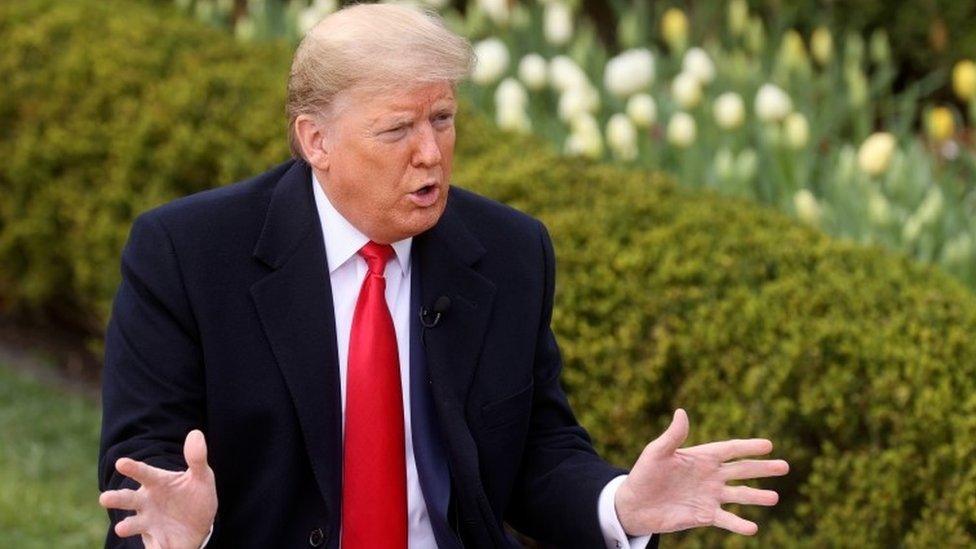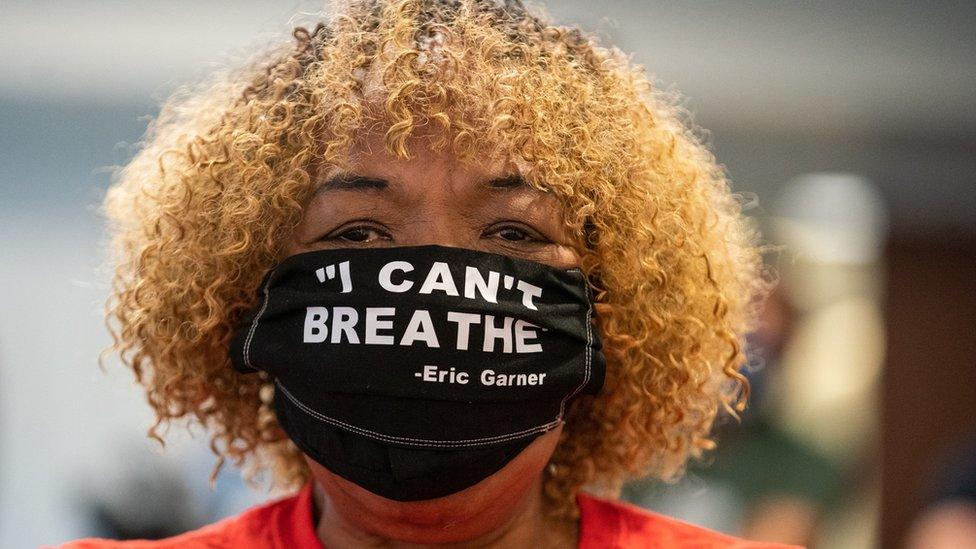George Floyd: Trump 'generally' supports ending chokeholds for police
- Published

Mr Trump has come under fire for his handling of the protests in the US
US President Donald Trump has said the controversial chokehold method for restraining some suspects should "generally speaking" be ended.
Some US police forces have moved to ban chokeholds since the outbreak of anti-racism protests sparked by the death of George Floyd, an African American.
Mr Floyd died after a white officer knelt on his neck for nine minutes.
Mr Trump said it would be a "very good thing" to ban chokeholds but they may still be needed in some situations.
The president's comments come with Democrats and Republicans in the US Congress trying to hammer out the details of a police reform bill - the proposed Justice in Policing Act of 2020.
Mr Trump told Fox News that chokeholds sounded "so innocent, so perfect" but that if you get two-on-one, "it's a different story".
But he continued: "If a police officer is in a bad scuffle and he's got somebody... you have to be careful.
"With that being said, it would be, I think, a very good thing that generally speaking it should be ended," he said, adding that he might make "very strong recommendations" to local authorities.
The police officer who knelt on Mr Floyd's neck has been sacked and charged with second-degree murder.
The history of police violence in the US
Pressure for US police reform
Mr Trump - who has faced criticism for his responses to the outbreak of the protests against racism and police brutality - said he wanted to "see really compassionate but strong law enforcement", adding "toughness is sometimes the most compassionate".
Challenged by interviewer Harris Faulkner, external to explain his tweet last month that "when the looting starts, the shooting starts", which was censored by Twitter for glorifying violence, the president said: "When the looting starts, it oftentimes means there's going to be... sure, there's going to be death, there's going to be killing. And, it's a bad thing."
The Justice in Policing Act was proposed by the opposition Democrats who control the House of Representatives but in order to pass it must win the support of Mr Trump's Republicans who control the Senate.
There is potential for the two parties to reach agreement on banning chokeholds and no-knock warrants, like the one in the Breonna Taylor shooting.

Gwen Carr's son Eric Garner died in a police chokehold in 2014
Meanwhile, the city council in Minneapolis, where Mr Floyd died, passed a resolution on Friday to replace its police department with a community-led public safety system.
It comes days after the council voted to disband the police department.
According to the resolution, the city council will begin a year-long process of engaging "with every willing community member in Minneapolis" to come up with a new public safety model.
In New York, Governor Andrew Cuomo has ordered police departments to undertake major reforms, in response to the demonstrations.
Houston police chief: Chokeholds "should be banned"
Mr Cuomo said he would stop financing local authorities that failed to adopt reforms addressing excess use of force and bias in their police departments by next April.
He said he would sign an executive order for municipalities to "reinvent and modernize" their police departments to battle racism. Police disciplinary records would be publicly released and chokeholds would become a felony punishable by up to 15 years in prison.
"That should be done in every police agency in this country," Mr Cuomo was quoted as saying by Reuters news agency.
Sitting alongside the governor at the news conference were Gwen Carr and Valerie Bell, the mothers of Eric Garner and Sean Bell, two unarmed black men who died in incidents with police.
Mr Garner died when a white police officer used a chokehold on him while making an arrest in 2014.

More on George Floyd's death:
"Keep pushing": Washington DC protesters on keeping the momentum going
VIEWPOINT: Tipping point for racially divided nation
TIMELINE: Recent black deaths at hands of police
BACKGROUND: Five pieces of context to understand the protests
CRIME AND JUSTICE: How are African Americans treated?